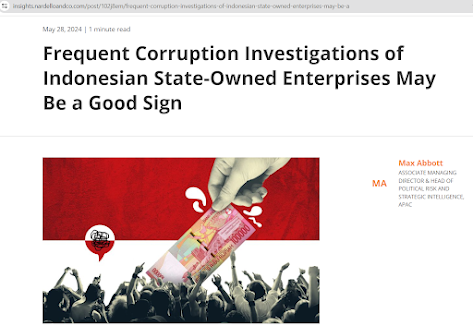A friend of mine has just posted an article that he
wrote on Linkedin, which reminded me of that wonderful British TV series, “Yes
Minister,” which told tale of a politician and his civil servants. One of the
jokes that people used to tell, was that “Yes, Minister” and “Yes, Prime
Minister,” told you everything you needed to know about how government’s
function. One the great teaching moments came in a scene when the chief civil
servant explained why government secrecy was necessary. He said “If people don’t
know what you’re doing; the don’t know what you’re doing wrong.”
In the British context, this remark is something of a
joke. While Britain and much of the Western world are far from perfect, issues
like government corruption are often things that don’t hit home for the
ordinary person. It’s a slightly different matter in developing countries, where
issues like corruption become part and parcel of everyday life. I live in
Singapore and although I don’t really “feel” the possibility of government corruption
in my daily life, I’m just a short bus ride away from Malaysia, where getting
shaken down for bribes once in a while is fairly common.
I bring this up because a lot of “democratic” societies
(for the purpose of argument, Singapore will be included), are now looking at
things at putting on caps on basic freedoms like freedom of the press. One only
has to think of the way media publications need licenses or worry about losing
advertiser support or the sudden strengthening of libel laws to see how media
controls are being subtly imposed.
In Singapore, our system of media management was based
on Lee Kuan Yew’s main argument that “he” would set the agenda. His consistent
point to media outlets around the world was “nobody elected” you and so, our
local media scene has been infamously tame when it’s come to questioning
government or for that matter of fact, anyone in any position of authority – ie
chairmen and CEOs of companies. I believe the phrase used in Singapore is “responsible.”
So, thanks to this “conditioning” it becomes very easy
to assume that when things get reported, that something bad is happening. I
remember trying to explain to Thambi Pundek aka The Young Muslim Politician
from Pasir Ris GRC who guzzles Pork on a Ramadan Day, that democracy and the loosening
of control on the media was good for a country. He countered that this was not
necessarily true and gave the example of Malaysia under Mahathir and Malaysia
under Abdullah Badawi.
His logic was simple. Corruption scandals appeared in
the media under Badwai when they didn’t appear under Mahathir, therefore corruption
had increased. To be fair to Thambi, he’s not the only person who thinks this way.
One judges the state of the world by what’s happening and the only way you know
what’s happening is by what you read or hear about in the news.
However, as my friend from NardelloNardello argues, this is not
necessarily true and the slew of reports of the corruption in Indonesia’s state
owned enterprises might actually be a good sign rather than a bad one:
He has a point. Just because something isn’t reported,
it doesn’t mean its not happening. We need to remember; publicity is not good
for crooks. Would you, for example, advertise that you were stealing?
I mean, there is an argument to say that things aren’t
reported because they aren’t happening. However, if you live in a part of the
world where you can get slapped down for saying things that someone in power
doesn’t like, the argument that things aren’t reported because publishers and
broadcasters have figured that the cost of reporting is simply not worth it
(being sued to bankruptcy, beaten up, harassed, murdered etc).
Let’s remember, that journalist have a legal and moral
obligation to tell the public about what’s going on. Yes, there have to be
certain laws in place to ensure that journalist write facts and that there is a
certain amount of objectivity in their reporting. People should not be “slandered”
because they were p***ed off with someone they didn’t like.
However, journalist do play an important role in
making sure people know what’s going on. When it comes to things like “corruption,”
that role becomes even more important because people then become aware that
they’re being screwed over. Let’s face it corruption is like a lot of things. People
get comfortable with it and accept it as fact of life and you need public
pressure to get people out of their complacency. How does that happen? The
usually when people are aware of what’s going on.
So, the next time you see a slew of corruption
scandals being reported where there were none before, it’s not necessarily a
sign that corruption has increased. Its more likely to be sign that corruption
is finally being exposed and change for the better is on the way.

No comments
Post a Comment